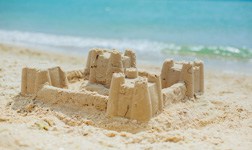
Did you know that your Florida homestead could be a problem when you die? Most people don’t, and this results in pretty constant income for probate attorneys. As much as I appreciate having your children pay me for the probate of your home, I’d prefer to help you avoid this (usually) unnecessary hassle and expense.
What exactly do I mean by “homestead”? In Florida, that’s a broad legal term that has different meanings and different ramifications under the laws. Our homestead laws fall into three categories: exemption from forced sale (creditor protection), restrictions on transfer and devise (protects spouses and minor children), and property tax exemptions (reduces property taxes). Once you die, your property tax exemption is not longer applicable – that’s not the homestead law I’ll be discussing here. Exemption from forced sale and restrictions on who you can leave your homestead to are the biggies once you’re dead. They’re both addressed in Article X, Section 4, of the Florida Constitution.*
What qualifies as “protected homestead” under Article X? First, it has to be your primary residence and you have sole ownership (not joint, not in a trust, etc.). If the real estate that’s your primary residence is located within a municipality (within city, town, or village limits) your homestead is limited to one-half acre of contiguous land. If located outside a municipality (such as in a county), your homestead can include up to one hundred sixty acres of contiguous land. If your home fits into one of these categories, you’re covered under Florida homestead laws – whether you want them or not. So, what does that mean?
First, it means that if you’re the sole living owner of protected homestead and you’re married and/or have a minor child when you die, you can only leave your home to the people Florida mandates. If your Will or Trust gives the property to someone else, the probate judge will void that gift and distribute the home to whoever is entitled under FL law. If you’re not married and have no minor children when you die, you can leave the home to anyone you wish.
Second, assuming that you’ve devised your home to a legally-approved person, and he or she is your spouse or a blood relative who would be entitled to inherit under Florida’s laws of intestacy, then your home will not have to be sold to pay off the debts you died owing (except for a mortgage or home equity loan). The home and any loans against it will go to the heir. However, if you die single, with no minor children, and leave the home to your boyfriend, the homestead will no longer be “protected” and could be forced into a sale to pay off your debts.
Okay, that’s all fine and dandy. But what people don’t realize is that, due to a weird quirk in Florida law, homestead property owned by a sole individual – whether it’s “protected” or not – has to go through the probate process before it can get to the rightful heir. And while a Personal Representative can sell an investment property very quickly (as long as the Will gives him that power), the Personal Representative CANNOT sell the protected homestead. Under the law, the spouse, minor child, or other heirs inherit it as soon as you die, but, due to scam artists and other criminals, our laws now require that a probate judge sign and record an Order declaring who is the rightful owner under the law. A formal probate is a strictly defined process, so it can take 5-6 months from when the probate was opened to get that Order, which allows the heir to sell the homestead. In the meantime, who’s paying the legal fees, mortgage, insurance, property taxes, pool and yard maintenance, etc.? Where’s that money coming from? If your home will land in probate, so should all your other assets so there’s cash to pay your debts and the home’s upkeep for several months until it can be sold.
I often have married couples tell me, “Well, we’re joint owners on the house, so there won’t be a probate. It’ll go right to the survivor.” And they’re correct – assuming they both don’t die at about the same time. Or assuming that the survivor will actually take steps to prevent the homestead horror from happening before he or she dies.
This is all very easily avoidable – the key is planning. Give us a call at 941-444-5958 to make sure you don’t leave behind a homestead horror for your family.
* Mobile homes on rented land aren’t covered under Article X, but they have some protections under Florida Statute 222.05.
Other articles you may find interesting:
What’s the Big Deal About Supreme Court Reform?
Don’t Put Money into Property You Don’t Own
Ready to make sure everything’s in order for your loved ones in the event you become incapacitated or die? Give Manasota Elder Law a call at 941-444-5958. We’ll help you determine whether you’re all set, or whether there are still some things that need to be done to protect what’s most important to you … your family.








